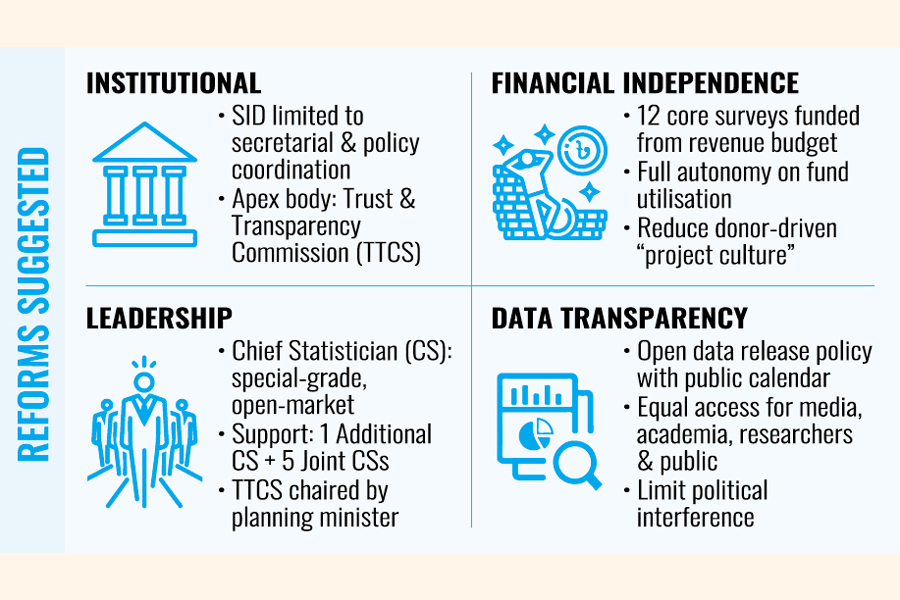
Published :
Updated :

A government taskforce has recommended transforming the Bangladesh Bureau of Statistics (BBS) into an independent statutory body to reduce bureaucratic control by the Statistical and Informatics Division (SID).
On Monday, the taskforce, led by Dr Hossain Zillur Rahman, executive chairman of the Power and Participation Research Centre (PPRC), presented its reform report at an event marking the National Statistical Day, with Planning Adviser Dr Wahiduddin Mahmud attending as the chief guest.
The taskforce proposed that the SID's role be limited to providing secretarial services to the BBS, along with administrative oversight and policy coordination.
Proposing a new name, "Statistics Bangladesh (StatBD)," the taskforce also suggested reducing donor dependency for core surveys - such as the Population Census, HIES and LFS - and advised financing 12 key surveys with revenue funds.
Earlier, the government formed the eight-member taskforce, headed by Dr Hossain Zillur Rahman, to prepare reform proposals for the BBS.
The taskforce recommended creating new posts, including a chief statistician (CS) with full independence to publish data without government interference. The CS would be a special-grade officer appointed from the open market, supported by an additional CS (Grade-1) and five joint CSs (Grade-2), to manage the national statistical organisation (NSO).
"As an NSO, BBS currently lacks an apex governing mechanism that could strengthen its institutional profile and performance through mandated accountability," the report says. "Oversight functions are bureaucratically exercised by SID, limiting access to high-level policy constituencies."
The taskforce emphasised the need for a well-designed apex governing mechanism to enhance organisational accountability and elevate BBS's institutional status.
It noted that although the Statistical Act 2013 provides a legal mandate, institutional independence and professional autonomy are hampered by limited control over personnel decisions, dependence on non-professional approval structures, uncertain funding, and an unclear distribution of responsibilities between SID and BBS.
To address these issues, the taskforce proposed forming a Trust and Transparency Commission of Statistics (TTCS), with the chief statistician accountable for all NSO activities.
The TTCS would act as the selection committee for the CS, review and approve annual reports, expenditure audits, and budgets, and oversee recruitment rules and policy frameworks. It would be chaired by the planning adviser/minister, with the finance adviser/minister, chair of the Parliamentary Standing Committee on the planning ministry, four independent experts, the chief statistician as member-secretary, and the SID secretary as an ex-officio member.
On financial independence, the report said, "BBS suffers from both inadequate budgets and poorly utilised funds. Without addressing these critical resource issues, BBS will be unable to evolve into a dynamic and competent NSO."
It recommended securing sufficient national budget allocations for core surveys and training facilities, with full autonomy over revenue budget utilisation. While the BBS may seek development partner support for specialised surveys, it must avoid the entrenched "project culture" caused by donor dependence.
Regarding data trust, the taskforce observed that political interference in data release has undermined BBS's credibility. It called for an open data and release policy with a public calendar for all statistical publications, ensuring equal access for government, media, academia, researchers and the public.
The taskforce identified 12 core surveys to be financed from the revenue budget, including the Population Census, Agriculture Census, Economic Census, National Income Accounting, HIES, LFS, Sample Vital Surveillance System, Survey of Manufacturing Industries, Survey of Service Industries, Agriculture Crop Surveys, Consumer Price Index, and National Climate Change Impact and Disaster-Related Statistics.


 For all latest news, follow The Financial Express Google News channel.
For all latest news, follow The Financial Express Google News channel.